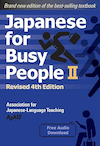初級日本語2レベルの内容
- プログラム
- 標準的な必要レッスン数: 90分レッスン × 54回(学習者の状況、レッスンの頻度、1回のレッスン時間によって異なります)
| 課 | 文法のポイント |
|---|---|
| 1 | ~で~がいちばん~です。 ~たいんですが、・・・。 なにがいいですか。 ~は~がいいです。 |
| 2 | ~のほうが~より~です。 [comparisons] ~は~が[adjective] ~にします。 [choosing and decision] |
| 3 | ~は~より~です。 ~はいちばん~です。 どこか/なにか/だれか ~にいきます。 (go to do ...) [purposeの「に」] ~ましょうか。 (Shall we ...?) |
| 4 | Plain forms of verbs: た-form, なかった-form Plain forms of adjectives and [noun]+です。 ~とおもいます。 (I think ...) ~でしょうか。 [soliciting suggestions] |
| 5 | ~といっていました。 (... said ...) ~てみます。 (try to do ...) ~てきます。 (go, do something and return) |
| 6 | たかい/たかくて、 きれいな/きれいで [adj. → connective] ~ています。 [completion and result] |
| 7 | ~たことがあります。 [experience] [verb]+んです。 ~も [emphasizes large amount] |
| 8 | ~たり、~たりします。 ~ながら ~ましょうか。 (Shall I ...?) |
| 9 | Potential form 「いきます」→「いけます」 ~ので [giving a reason] |
| 10 | [noun]のとき/[adjective]とき ~てから (after ...ing) |
| 11 | ~く/になります。 [verb]+とき |
| 12 | かまくらでとったしゃしん [modifying the noun] みえる/きこえる (visible/audible) ~に~かい (... per ...) |
| 13 | ~たほうがいいです。/~ないほうがいいです。 (should /should not) はやい/はやく、 しずかな/しずかに [adj. → adv.] |
| 14 | ~なければなりません。 (have to) ~なくてもいいです。 (don’t have to) まだ~ていません。 (not yet) |
| 15 | りゆうの「て」、「で」 [giving a reason] ~て/で+[きもちのことばemotional expressions] |
| 16 | Volitional form 「いきます」→「いこう」 [Volitional form]+とおもいます/おもっています。 までの/からの/への/との/での |
| 17 | [verb]+の [nominalizing sentences] ~のばあい (In case) ~こともあります。 (It sometimes happens that ...) |
| 18 | ~さ [used to nominalize adjectives] ~たら (when ...) ~あいだに (while ...) ~よてい (plan to ...) 自動詞と他動詞 じどうしと たどうし [intransitive verb/transitive verb] |
| 19 | ~かもしれません。 (maybe ...) ~たら (if ...) |
| 20 | ~たら~ました。 [unexpected; surprise; result] ~てしまいました。 [regret or completion] |
| 21 | ~ば [conditional form] ~しか~ない [showing there is little of something] |
| 22 | ~そうです。 (seems ...; looks like ...) ~なら (if it's the case ...) |
| 23 | ~と (when ...) [speaking of natural or habitual result] ~でしょう(か)。 [expressing suppositions] |
| 24 | ~し、~し、 [giving more than one reason] ~てきました。 [expressing continuation from the past to present] ~ていきます。 [expressing continuation from present to future] ~がほしいです。 (want ... [object]) |
